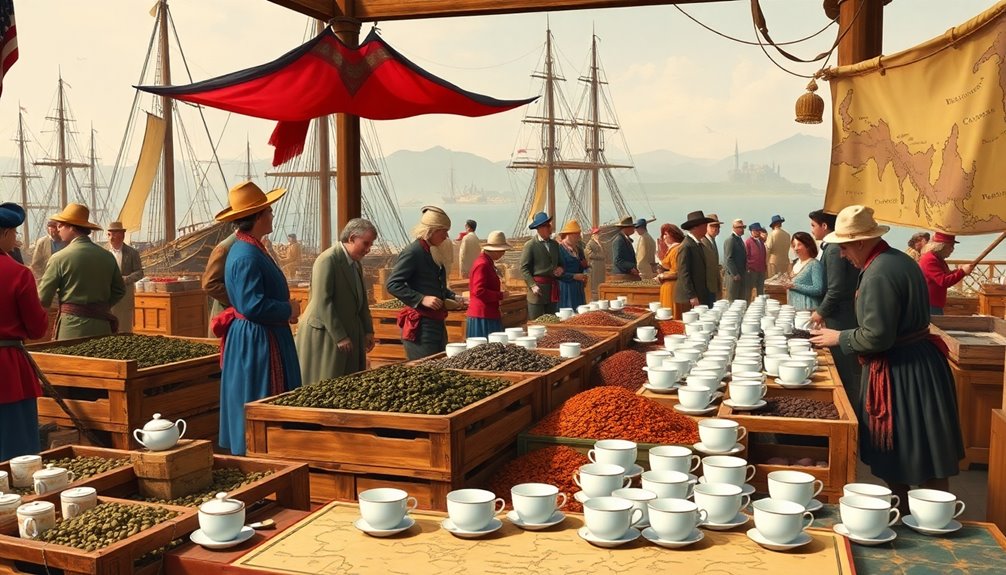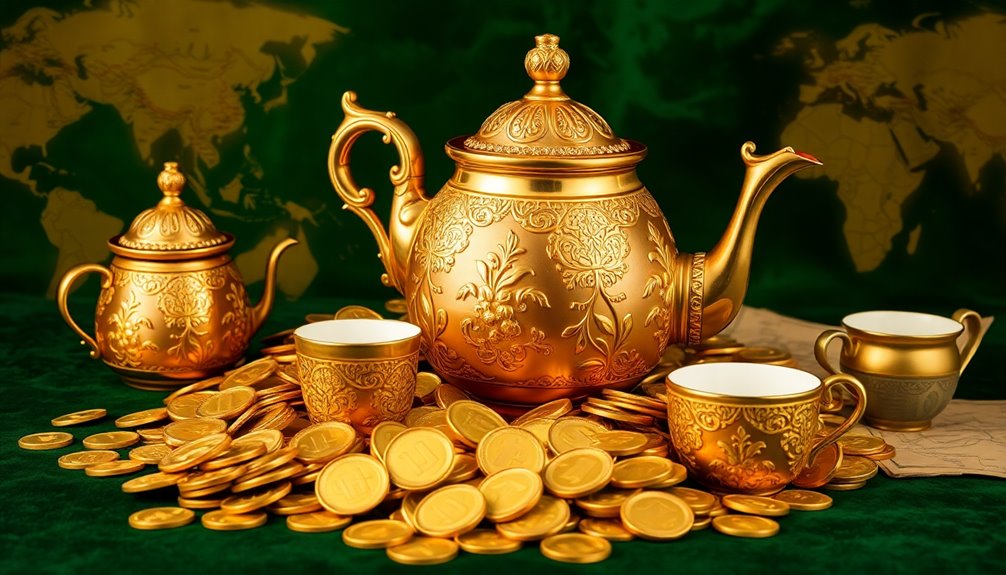The 18th-century London tea tax was more than just a government revenue tool; it affected trade dynamics and colonial relations. By taxing imported tea, Britain aimed to boost funds to pay off debts, but it also raised costs for colonial merchants and consumers. This strained trade networks, encouraged smuggling, and sparked unrest like the Boston Tea Party. If you explore further, you’ll see how these economic policies helped ignite revolutionary change and shaped history.
Key Takeaways
- The tea tax was designed to boost government revenue amid Britain’s war debts, impacting colonial trade and economic stability.
- It increased import costs, making tea less competitive and encouraging smuggling, which undermined official revenue efforts.
- The tax highlighted economic oppression, fueling colonial resentment and resistance, exemplified by events like the Boston Tea Party.
- Smuggling and illicit trade became widespread, disrupting established trade networks and challenging Britain’s economic policies.
- The tea tax became a symbol of economic control and political unrest, illustrating how taxation policies can ignite widespread protest.

Have you ever wondered why the 18th-century tea tax in London sparked such fierce debate? It all boils down to the complex interplay of colonial trade and taxation policies that shaped the economic landscape of the time. During this period, Britain was expanding its empire, establishing colonies across the Atlantic and beyond. These colonies became essential sources of raw materials and markets for British goods, fueling an intricate system of colonial trade. Tea, imported from Asia via these colonial ports, became a highly sought-after commodity, symbolizing both luxury and independence. The government saw taxing tea as a way to boost revenue, but this approach had far-reaching consequences.
The 18th-century tea tax fueled colonial unrest by intertwining trade, taxation, and the fight for independence.
The tea tax was part of Britain’s broader taxation policies designed to generate income to cover debts from previous wars and wars to come. However, these policies often failed to account for the growing resistance among colonists and traders. Taxation policies like these were perceived as unfair because they lacked colonial representation in Parliament. This disconnect fueled resentment, as colonists believed they shouldn’t be taxed without having a voice in how those taxes were decided. The tea tax became a flashpoint, illustrating how economic policies could ignite political unrest.
In addition, the tax’s impact on colonial trade networks further exacerbated tensions, as it threatened established economic relationships and trade practices. The tax was a burden on colonial trade. It increased the cost of importing tea, making it less competitive compared to smuggled or locally produced alternatives. This prompted widespread smuggling and illicit trade, undermining the official revenue-raising efforts. The colonial traders, who relied heavily on importing tea, felt the pinch, and many began to see the tax as a symbol of economic oppression. The famous Boston Tea Party, where colonists dumped British tea into the harbor, was not just about tea but a protest against these unfair taxation policies. It was a powerful statement that economic control and taxation policies could galvanize resistance when they threatened the economic interests of colonists.
Furthermore, the economic implications extended beyond immediate revenue. The tea tax disrupted established colonial trade networks, encouraging illegal activity and fostering distrust between Britain and its colonies. It also demonstrated how taxation policies could influence trade patterns and economic behavior. Instead of simply raising funds, the tax threatened to destabilize a pivotal part of Britain’s colonial economy, showing that economic policies have the power to both shape and shake the foundations of empire. All these factors combined to turn a simple tax into a symbol of colonial resistance, illustrating how deeply intertwined economics and politics were in shaping history.
Frequently Asked Questions
How Did the Tea Tax Influence Global Trade Routes?
You can see that the tea tax substantially affected global trade routes and colonial expansion. It prompted merchants to seek alternative routes to avoid high taxes, leading to the development of new shipping paths. As colonies responded with protests and boycotts, trade patterns shifted, and colonial powers expanded their influence. This change fueled competition, altered global commerce, and ultimately contributed to the broader dynamics of colonial expansion and economic power.
What Were the Social Impacts of the Tea Tax on London’S Population?
Like a storm brewing in the harbor, the tea tax stirred social unrest among London’s people. You’d notice shifts in consumer behavior, as many resisted or found clever ways to dodge the tax, fueling protests and boycotts. The tax deepened class divides, fostering resentment and shaping public opinion. This unrest highlighted how economic policies can ripple through society, influencing daily life and social cohesion in profound ways.
Did the Tea Tax Affect Other Commodities’ Taxation Policies?
You see, the tea tax influenced broader tax policy changes, impacting colonial economics and trade regulations. As authorities realized the importance of balancing revenue with economic growth, they adjusted taxes on other commodities to avoid smuggling and unrest. These shifts aimed to strengthen control and revenue, reflecting a strategic approach to taxation. So, the tea tax’s effects extended beyond tea, shaping overall colonial and trade policies in a significant way.
How Did Merchants Adapt to the Tea Tax Economically?
Like Icarus flying too close to the sun, merchants faced the heat of the tea tax and soared with clever strategies. You adapt by employing merchant strategies such as smuggling, using dummy companies, and under-invoicing to evade taxes. These tactics help you minimize costs and maintain profits, showing resilience in a challenging environment. Your ability to innovate under pressure exemplifies how economic actors respond dynamically to government policies.
What Role Did Smuggling Play in Bypassing the Tea Tax?
You see, smuggling played a vital role in bypassing the tea tax by fueling illegal trade and expanding the black market. Merchants and smugglers worked together to bring in tea without paying taxes, undermining government efforts. This illegal trade made tea more affordable for consumers and kept demand high, despite the tax. It created a shadow economy that challenged official authority and shaped the tea market during that period.
Conclusion
So, understanding London’s 18th-century tea tax shows how even small taxes can shake things up and shape history. You now see how governments use taxes to influence behavior and raise revenue, often facing unintended consequences. Sometimes, you have to read between the lines—what seems like a simple policy can have ripple effects that change everything. In the end, it’s a reminder that money talks, and everyone’s listening.










